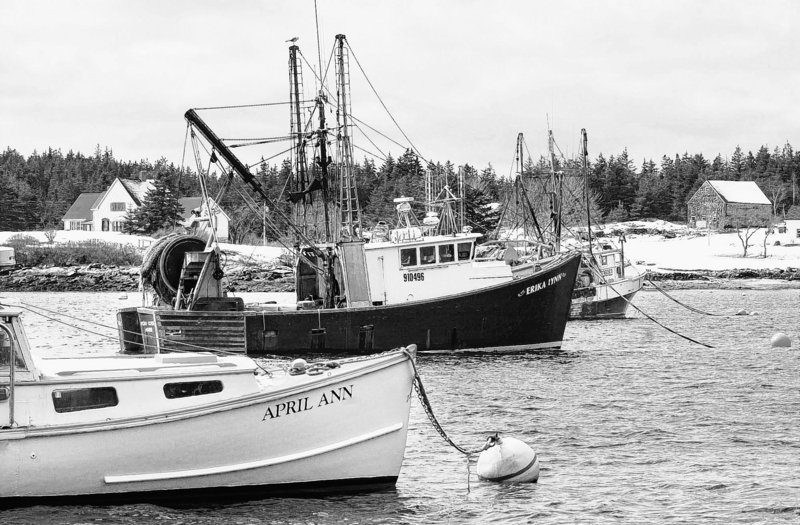KENNEBUNK – Bringing Maine’s groundfishing fleet back to Portland has once again become a hot topic. Recent press coverage of this issue has done the state, the city of Portland and the groundfishing industry a huge disservice by suggesting responsibility for solving this issue lies with the lobster industry.
Let’s look at a few facts. Maine’s groundfish landings took a dive in the 1990s and 2000s not because Maine draggers couldn’t land lobsters in Portland but because federal days-at-sea regulations inevitably made it sensible for those vessels to berth in Gloucester, Mass., or Boston rather than in Portland. Why? Because with a limited number of days available in which to fish, a sensible captain moved his boat as close to the fishing grounds as possible. As landings declined, cutting costs became essential to make up for lost revenue.
For the portion of the fleet that remains in Portland, what has the city done for them lately? Portland weakened its working waterfront zoning and began charging fishing vessels along its wharves for electricity. It also laid off the entire city staff working on commercial fisheries and waterfront issues and closed the port office.
LEADERSHIP NEEDED
Maine can’t move itself any closer to Georges Bank nor to the seafood markets located in Boston. Instead, Maine must show leadership and vision to think strategically in its plan to revitalize groundfishing.
Port Clyde is doing just that. The groundfishermen there formed a local marketing cooperative, made partnerships with state and private organizations and invested in local shoreside infrastructure to keep their fleet landing fish locally.
New Bedford, Mass., and Gloucester also have a long history of stepping up to the plate. New Bedford is installing shoreside power pedestal connections to provide affordable power for its fishing fleet. This will reduce carbon emissions by providing vessels an alternative to running diesel generators while in port. Jodrey State Pier in Gloucester was refurbished by Massachusetts in the 1990s to become the cornerstone of the city’s working waterfront. It offers affordable berthing to fishing vessels and state-of-the-art loading facilities, which in turn attracted Cape Seafoods, a seafood processing company, as a tenant.
Maine’s goal should be to bring businesses like Cape Seafoods to Maine, not to settle for diverting a few fishing trips to Portland for nostalgia’s sake.
Fortunately, Gov. LePage and the Legislature have shown commitment to Maine’s commercial fisheries by providing a rebate to fishermen on the fuel sales tax.
This is a start, but it is just one step. Maine’s groundfishing fleet continues to face a litany of challenges, including ever-increasing dockage and berthing fees, taxes, and the availability and price of shoreside support including ice, gear, and vessel maintenance.
It should also be noted that Maine’s lobster fishery has been a safety net for the groundfish industry during the management changes that began nearly 20 years ago. Because of careful stewardship of the resource by Maine lobstermen, many Maine groundfishermen were able to trade in their nets for lobster traps. Conversion of groundfishermen to lobstermen has resulted in overall economic gain for the state of Maine and its coastal communities.
CONSERVATION AT THE CORE
Maine lobstermen do not land groundfish caught as bycatch in their traps. Bycatch, by definition, is something that should be minimized and avoided to the extent possible, not incentivized with financial reward.
Both the Maine and Canadian lobster fisheries allow only trap-caught lobster to be landed and sold, a fundamental form of conservation that has done much to keep our lobster populations robust.
The use of passive trap gear also assures consumers a high quality, sustainably harvested product. Encouraging groundfishing vessels to relocate to Portland should not be based on undermining a core conservation measure of Maine’s lobster industry.
Focusing solely on the lobster bycatch issue erroneously suggests that there is a single solution while creating division within the fishing industry. To see a thriving groundfishing fleet in Portland in future years will require financial investments as well as strong leadership from both Portland and the state of Maine.
– Special to the Telegram
Send questions/comments to the editors.



Success. Please wait for the page to reload. If the page does not reload within 5 seconds, please refresh the page.
Enter your email and password to access comments.
Hi, to comment on stories you must . This profile is in addition to your subscription and website login.
Already have a commenting profile? .
Invalid username/password.
Please check your email to confirm and complete your registration.
Only subscribers are eligible to post comments. Please subscribe or login first for digital access. Here’s why.
Use the form below to reset your password. When you've submitted your account email, we will send an email with a reset code.